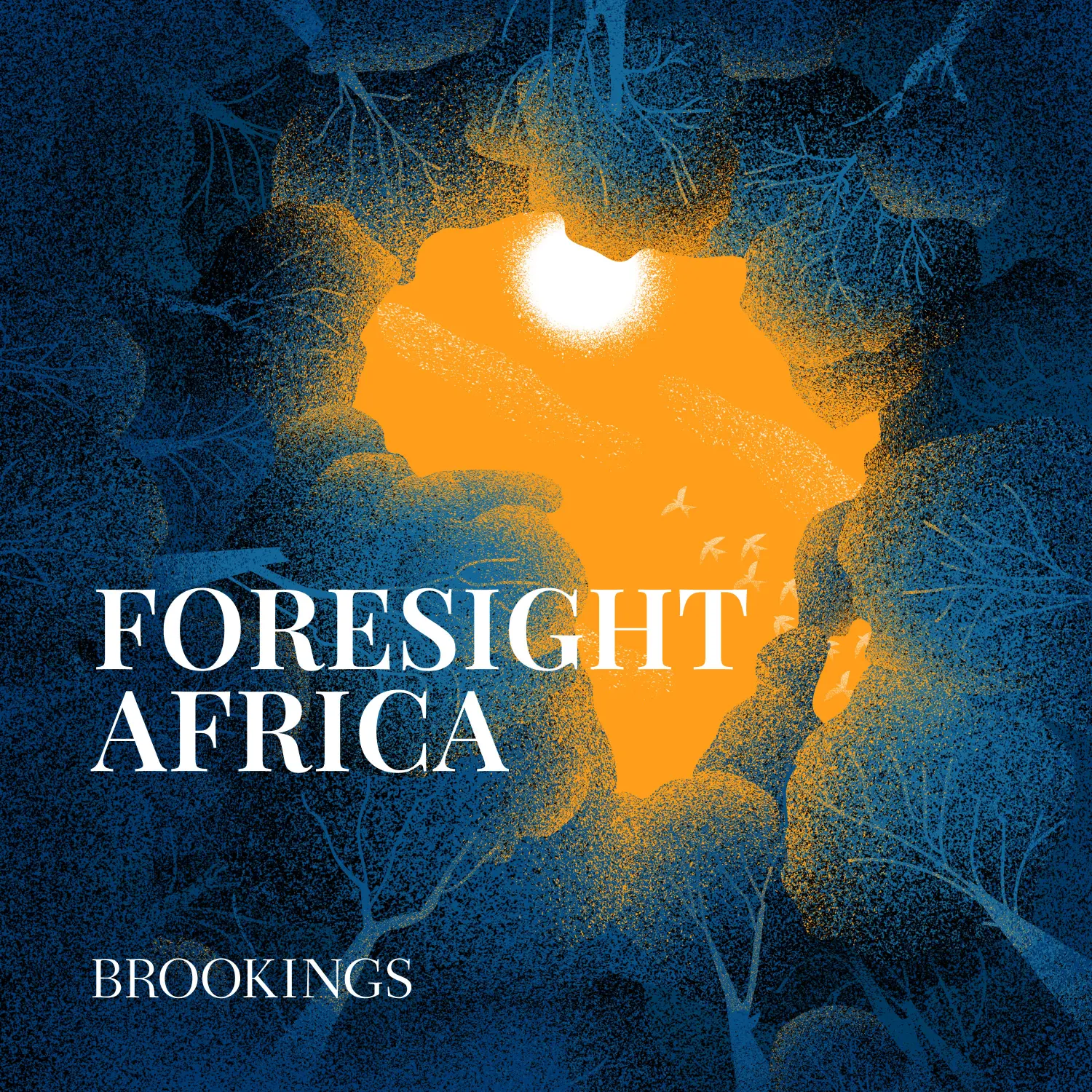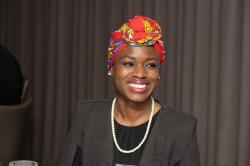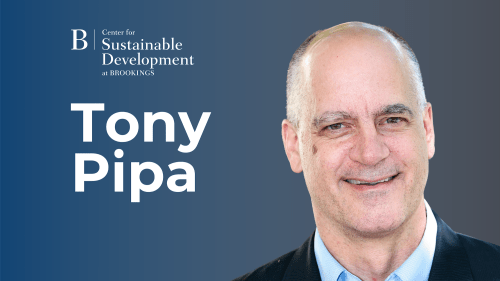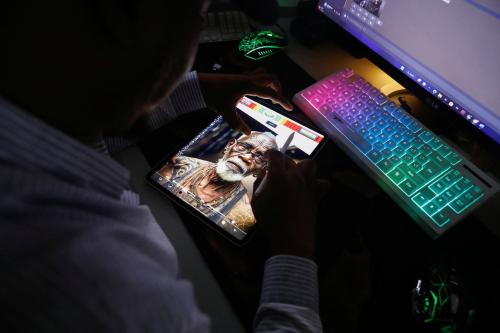Public procurement is the system of laws and operational arrangements that allows the public sector, including the government, to purchase goods and services, with the aim to maximize social welfare and do public good. However, many African countries fail to address legal and social impediments women-owned businesses face when trying to participate in procurement activities. Host Landry Signé is joined by Professor Sope Williams to describe these barriers and how to design a procurement system that allows women to participate fully.
- Subscribe and listen to Foresight Africa on Apple, Spotify, Afripods, or wherever you listen to podcasts.
- Watch episodes on YouTube.
- Learn about other Brookings podcasts from the Brookings Podcast Network.
- Sign up for the podcasts newsletter for occasional updates on featured episodes and new shows.
- Send feedback email to [email protected].
Transcript
[music]
SIGNÉ: Hello, I am Landry Signé, senior fellow in the Global Economy and Development Program and the Africa Growth Initiative at the Brookings Institution. Welcome to Foresight Africa podcast, where I engage with contributors to our annual Foresight Africa report, as well as with policymakers, industry leaders, and other key figures. You can learn more about this show and our work at Brookings dot edu slash Foresight Africa podcast.
Today on the podcast I am pleased to welcome Professor Sope Williams. Sope Williams is a professor and the head of the Department of Mercantile Law, as well as the deputy director of the African Procurement Law Unit at Stellenbosch University in South Africa. She specializes in anti-corruption, public procurement, sustainable development, and commercial law, and has authored over 50 publications in these areas.
Welcome to the show, Professor Williams.
WILLIAMS: Thank you very much, Landry. It’s a pleasure to be here today.
SIGNÉ: Sope, can you explain what public procurement is for those who may be unfamiliar?
[1:42]
WILLIAMS: Thank you, Landry. So, public procurement refers to the system of laws, institutions, operational arrangements by which a government or a public sector entity buys the goods, services, and the construction that it requires in order to function and maximize public welfare.
So, anytime the government buys anything, whether you’re talking about paper clips or fighter jets, those types of purchases would go through the public procurement system. So, when we’re talking about procurement, that’s we’re talking about, the process by which the government buys things that it needs to function, to maximize public welfare, to do whatever it needs to do to fulfill its social contract.
SIGNÉ: Fantastic. Can you describe how you became interested in public procurement and anti-corruption law?
[2:45]
WILLIAMS: Yes, yes, I can. It’s it’s quite an interesting story. So, I am from Nigeria, and I am a lawyer. I studied law at the University of Lagos in Nigeria. And then I moved to London to do a master’s in law at the London School of Economics. And after studying in London, I started working as an academic in the University of Stirling in Scotland. I always wanted to be an academic, so that was really just what my focus was.
Anyway, a few years at the University of Stirling, and then I moved to the University of Nottingham. And when I got to the University of Nottingham, of course, I had a master’s degree, but I didn’t have a doctorate degree. And there were discussions on, you know, would I do a doctorate degree and what field of law was I interested in?
And when I got to the University of Nottingham, I had been allocated a lady who was a public procurement law expert as my mentor. So, she started talking to me about public procurement. And it was a new field. Even still now it’s still a nascent academic discipline when it comes to the law, anyway. So, she was talking to me about public procurement.
At the same time my mother in Nigeria, who was still working then, she’s retired now, had just been made the head of what they called then the Division of Joint Services in the Nigerian Ministry of Defense. So, my mom became responsible for procurement contracts in the Ministry of Defense. So, my mentor at work was talking to me about public procurement. My mom at home was engaging in the practice of public procurement. And I just became interested in trying to marry what my mom was talking to me about with what my mentor was saying.
Of course, because my mom was in practice in Nigeria, there were a lot of discussions around corruption and unethical practices. My mentor was talking about you know, the legal frameworks in the European Union and in the UK and all that.
So, I decided that I would do a doctorate that really examined legal frameworks for addressing corruption in public procurement. And that’s how I did a doctorate at the University of Nottingham on public procurement and anti-corruption law.
SIGNÉ: I like the connection between your professional and personal experiences. And thank you for sharing, Sope.
You have been involved in several trainings on anti-corruption and public procurement, including for Nigerian lawmakers in the House of Assembly and investigators from the South African Office of the Public Protector. What examples of changes or outcomes that have happened because of these efforts can you share with us?
[5:27]
WILLIAMS: So, I’ll talk about the training with the office of the Public Protector in South Africa. So, that was a three-year project that ran from 2016 to 2019, where myself and a colleague—we run the African Procurement Law Unit at Stellenbosch University in South Africa—we were essentially hired to train the Office of the Public Protector investigators.
So, the Office of the Public Protector is an ombudsman that investigates a public sector maladministration. And increasingly, they were finding out that a lot of the complaints to this ombudsman dealt with procurement contracts and irregular contract awards and things like that. But the investigators didn’t have any knowledge or experience with public procurement law. So, when they were investigating, they couldn’t really understand what they were looking for. How do they determine whether a contract has really been awarded fraudulently? What are the factors that would indicate this? What are the red flags and things like that?
So, my colleague and I for three years, basically we traveled around South Africa to every province, the nine provinces in South Africa, training I think over 300 of these investigators in public procurement law, training them in anti-corruption law, training them in how to investigate corruption in public procurement, because, again, that’s really a specialist field.
And it was a grueling project, but it was really remarkable in the sense that at the end of those three years, the feedback that we got from these investigators was basically, this has been amazing. You’ve changed the way we do our investigations when it comes to procurement issues. So many things that they didn’t know about the law, about what breaches of the law were. We trained them on this and shared that knowledge with them.
So, there was a lot of changes in their operational behavior in the way that they investigate. And hopefully that would result in better investigations and better outcomes in procurement ultimately. So, that that was a project that I think was really successful.
[7:27]
And even recently the Office of the Public Protector reached out to us again to see, you know, some years have passed, five years have passed, they have obviously a new people in post in some of the places, new investigators, they want us to to commence this training again. So, the fact that there’s been a request for repeats, I think, shows that it was a bit successful. It was quite successful.
In terms of training the Nigerian legislators, that was actually ten years ago now. And what it was, it wasn’t so much training as it was awareness raising on what the role of the legislators were in ensuring accountability in public procurement. So, it was basically, explaining to them what Nigerian law requires of them as lawmakers in relation to the Public Procurement Act.
So, hopefully that was useful, but I can’t say what the changes might have been. But I would hope I would hope that it would, you know, broaden their awareness of what their role and how to fulfill that role for for the benefit of Nigerian citizens.
SIGNÉ: Thank you for your impact, Sope. You have authored several pieces for Brookings on procurement, from your recent piece, “Leveraging behavioral insights to mitigate public procurement corruption in Nigeria” to others, such as “The State of gender-responsive procurement in Nigeria.” Your Foresight piece takes a more zoomed out approach and looks at gender responsive procurement in Africa broadly. You named a few African nations that are addressing the legal and policy impediments preventing woman-owned businesses trying from participating in public procurement. Can you describe some of these policies in greater detail?
[9:24]
WILLIAMS: So, in terms of the policies that actually or the legal issues that prevents women from participating in public procurement in many African countries, I think the first is that many African countries don’t really have preferences or set asides or any way to prefer women in public procurement. And this is important because women-owned businesses, like women in most sectors, are discriminated against.
So, you have unconscious biases, you have conscious biases, more overt discrimination. And what that means is that women who are trying to access procurement contracts, whether or not they qualified, are discriminated against, so they don’t get those contracts.
So, the fact that there’s no legal mechanism in many African countries that actually sets aside or reserves a portion of procurement contracts for women means that women have to fight against these barriers, fight against entrenched interests in procurement, fight against male dominated markets, sectors in procurement in order to access procurement contracts. So, the fact that we don’t have legal requirements that prioritize women is one of the impediments that prevents women from accessing.
In terms of policy impediments there are few, but the ones that are probably have the most impact is the fact that many countries would have frameworks for gender equality, for women’s economic empowerment. But those policies do not contain any requirements for women to be prioritized in public procurement. They don’t contain any requirements to help women access procurement contracts. And a lot of policies that favor SMEs, or SMMEs actually, also have what they think is gender-neutral language. So, again, those policies, many, many of the businesses that are owned by women operate in the small, medium, and micro sectors. But the policies of those sectors don’t have language that supports women-owned businesses.
So, the language is supposed to be gender neutral. But of course, we know that no language is gender neutral. We know that because many policies are developed by men, you know, most public officials in positions of power, policymakers, are men. They develop these policies from a male-oriented lens. And even that language serves as a barrier to, to affect the way that women operate in those sectors.
But for me, the most important things are the fact that there’s an absence of legal frameworks, policies that are supposed to support women don’t actually do that because the language doesn’t take into account the express needs of women, doesn’t take into account the biases and the discrimination that women face. And doesn’t really do anything to support women in terms of the particular challenges that they have.
SIGNÉ: Which countries are outperforming in terms of addressing the challenges that you mentioned?
[12:29]
WILLIAMS: The countries that are performing, that are actually doing a lot of work to try to address these barriers: Kenya, Kenya comes out on top. In Nigeria, we have some states, not at the federal level or at the national level, but at the state level, that are actually outperforming. So, I’ll say Ekiti State is doing a lot of work in trying to address the barriers that women face in accessing procurement contracts. Kaduna State in Nigeria is also doing a lot of work to try to address the barriers that that women face.
So, in both these states that I’ve mentioned they have preferences for women. Ekiti state has in particular tried to ensure that women are included at various points in the procurement process. So, women are included in decision-making, so that decision-making doesn’t just happen from a a male-dominated perspective with all the biases that come with that. So, Kenya is doing is doing great. Nigeria in relation to some states is doing great.
SIGNÉ: Insightful, Sope. You also note that the participation of women-owned business in public procurement is extremely low, at approximately 5% of public contracts. Do you have a sense of what percentage of businesses in Africa are women-owned?
[13:49]
WILLIAMS: So, we have statistics from the World Bank, statistics from the Mastercard Foundation. And on average, women own in most African countries between 35 to 45% of businesses. But, these women-owned businesses, as I’ve said earlier, in the SMMEs sector, so small-,medium-, micro-enterprises, and also a large proportion of them are informal. So, even though women run businesses to a large extent in the economy, the informality is an issue. The size of those businesses is an issue. And the fact that because they’re so small and sometimes because they are informal, it’s difficult to scale those businesses because it’s difficult for them to get access to finance.
There’re other barriers, because in many African countries, still, even in order to get a business loan, you need to have sometimes real estate as a collateral. Many women culturally in some African countries are prevented from owning real estate. If you look at the land registries in many African countries, only a minute proportion of those real estate properties in the land registries are in the names of women. In most cases, land is held in the names of men or maybe jointly in the names of spouses.
So, the size and the informality makes it difficult for these women-owned businesses to scale, to grow. And that also obviously also has implications for how they can navigate procurement itself. Because procurement is is notoriously complex and technical as well.
So, I’d say in terms of the figures, we’re talking about 35 to 45%.
SIGNÉ: Thank you, Sope. one of your recommendations for policymakers is to create synergies between gender equality, public procurement, and women’s economic empowerment frameworks with measurable targets. What would be an example of a policy that accomplishes this, including measurability?
[15:52]
WILLIAMS: Thank you, Landry. That’s a great question. So, what that means, and I alluded to this a little bit already, what that really means is that if we have policies on gender equality, and we have policies on women’s economic empowerment, and we have policies on public procurement, we have to ensure that those policies are speaking to each other.
So, you’ll find that historically, many countries would have policies on gender equality. Right? But those gender equality policies don’t say anything about women accessing procurement. And we also don’t have any targets. So, they might say, we want to have gender equality. It’s important to us. We want women to be able to access economic opportunities. But then that’s it. So, what does that mean? It means it’s actually meaningless because no one can action the very vague and nebulous statements that you have in these gender equality policies.
Now, when you have women’s economic empowerment policies, a lot of them are focused on the private sector making space for women-owned businesses, the private sector removing the barriers to the businesses that are owned by women. And they don’t really have targets that are directed at the public sector. And of course, as I’ve said, they don’t have targets that deal with women being able to access public procurement contracts.
But I mean, public procurement is in many African countries between 20 to 40% of GDP. So, it’s a huge market, but it’s a market that is overwhelmingly dominated by businesses owned by men.
[17:23]
So, a good example is that if a country has a gender equality policy, and Rwanda is actually the only country that I’ve seen in my research that has done this, they have a gender equality policy that that expressly links gender equality to public procurement in the sense of, of course, women accessing procurement contracts at a rate that is fair and that is commensurate with women’s participation in the economy, but also ensuring that public sector, public services rather are designed in a way that takes into account the impact on women.
Because when we talk about gender responsive procurement, it’s not just women-owned businesses getting contracts, which is super important, but it’s also making sure that public services are suitable for users when those users are women. Because again, when things are designed, they’re designed from a male perspective. They don’t always take into account the sometimes-unique needs of women.
So, a policy framework that is designed for women’s economic empowerment should ensure that it has women being able to access public sector opportunities. If you have a policy framework that deals with gender equality, again, gender equality includes equality in terms of public procurement. So, you must have that these policies in different sectors are aligned and are speaking to each other and also have targets that are measurable. So, in some countries they have targets, like, okay, 30% of contracts by value, sometimes by number—although that’s a false measurement—by value should go to businesses owned by women. And they define what a business owned by a woman is. Again, to ensure that there’s no tokenism in terms of the allocation or award of public contracts to women-owned businesses.
SIGNÉ: I like those fabulous ideas. And Sope, would you mind elaborating on some countries, whether in Africa or outside of Africa, which have successfully implemented some of your recommendations?
[19:32]
WILLIAMS: So, I’ll say, in Africa the countries that I’ve worked closely with are South Africa and Nigeria. And South Africa is going through a procurement reform cycle at the moment. So, a new public procurement bill was signed off by Parliament. And during the time when the bill was being debated and the public was allowed to send in public comments, my unit, the African Procurement Law Unit, of which I am the deputy director, we sent in comments dealing with the issue of women’s access to public procurement.
And we found that in the later iteration of the bill, the comments that we had sent in on gender responsive procurement had been taken into account, and the bill had been modified to take those issues into account in terms of defining what a woman-owned businesses is, in terms of ensuring that there are sets of sites for women owned businesses.
So, we saw that change. So, at least that was considered, because in the earlier versions of the bill, it didn’t really speak to to gender in any meaningful way. But now it does.
SIGNÉ: Impactful, Sope. So, I really love it. As you know from previous Foresight Africa podcast episodes, I love finishing this session with a couple of questions for all my guests. AGI looks at Africa from an economic perspective and we focus on how to accelerate economic growth and structural transformation while fostering inclusion, especially for youth and women on the continent. Building on your work and experience, what is one piece of advice you will give to other African or global policymakers to create the best gender responsive procurement policies on the continent?
[21:31]
WILLIAMS: Thank you. Thank you, Landry. That’s a great question. So, if there was one piece of advice—and I just generally wouldn’t stop at one—but if I had to give one piece of advice, what I would say is that if countries are serious about ensuring gender responsive procurement in in Africa, I’ll say that they have to address the legal and the operational issues. So, legal issues I’ve mentioned already: ensuring that the legal framework allows procurement practitioners to prioritize women, obviously still on the basis of merit.
But the operational issues, I think are having more adverse impact on women’s participation in procurement because the operational issues are things like the language that is used in documents, which is not gender neutral, that language is usually not inclusive. It’s usually exclusionary. And as I’ve mentioned already, we have biases that are against women because we live in a patriarchal society. So, I think operationally, taking steps to remove this bias, will go a long way into ensuring that women can actually participate meaningfully in the public procurement sector.
So, I’ll give an example of what this means. Some years ago, I think maybe almost a decade ago or so, the Dominican Republic decided that they wanted to address the disparity in contracts awards to women-owned businesses. And they did a lot of things, they changed the legal framework to allow for preferences and all that. But one thing that they did, which had a huge impact was that they anonymized the bids that were received from companies. So, usually, a bid that is submitted will have the company name. And sometimes company names are gendered. Right? So, already the bias kicks in because if you’re someone who has an unconscious bias, you see a name that is not what you’re familiar with. You would have to find reasons to be able to justify why that company shouldn’t obtain the public contract.
So, anyway, they anonymized bids and almost overnight, businesses owned by women started obtaining public contracts from a base of about 5% by value in Dominican Republic to 29% almost overnight. And that just shows you that this bias was a real thing.
So, I would say that removing the operational barriers, removing the biases that women face in, in relation to gender responsive procurement will go a long way to ensure that women can participate meaningfully in public sector supply chains.
SIGNÉ: Insightful, Professor Williams. Given your successful career and impact, what advice would you give to youth and women hoping to follow in your footsteps?
[24:16]
WILLIAMS: As you said, I’m a professor of law, so I’m an academic, and I’ve been an academic for 24 years. I’ll say to anyone who wants to follow in my footsteps, who wants to go into academia, the advice that I will give to people, especially people of color, women, is be authentic and be excellent. And do excellence your way. I mentioned at the beginning that I’ve worked in universities in the UK, and I’ve worked in Nigeria, and I worked in South Africa. And even in Africa, our universities are still very Eurocentric, and even the production of knowledge is very Eurocentric. And obviously because of colonialism and neocolonialism, we still prioritize Eurocentric ideologies and Eurocentric knowledge over African ideas and African knowledge.
So, I would say to anyone who is in Africa who wants to be an academic, be authentic, be yourself, produce excellent work, but produce work that speaks to who you are as a person, as a woman, and as an African.
SIGNÉ: What a beautiful way to conclude. Thank you so much for joining us on this show today, Professor Williams.
WILLIAMS: Thank you. Landry. It was really good to speak to you.
[music]
SIGNÉ: I am Landry Signé, and this has been Foresight Africa. To learn more about this show and our report, visit Brookings dot edu slash Foresight Africa podcast.
The Foresight Africa podcast is brought to you by the Brookings Podcast Network. Send your feedback and questions to podcasts at Brookings dot edu.
My special thanks to the production team, including Kuwilileni Hauwanga, supervising producer; Fred Dews, producer; Nicole Ntungire and Alexandria Cordero, associate producers; and Steve Cameron, audio engineer.
This show’s art was designed by Shavanthi Mendis. Additional support for this podcast comes from my colleagues in Brookings Global and the Office of Communications at Brookings.
The Brookings Institution is committed to quality, independence, and impact.
We are supported by a diverse array of funders. In line with our values and policies, each Brookings publication represents the sole views of its author(s).









Commentary
PodcastAddressing public procurement barriers will empower women-owned businesses in Africa
Listen on
Foresight Africa Podcast
August 7, 2024